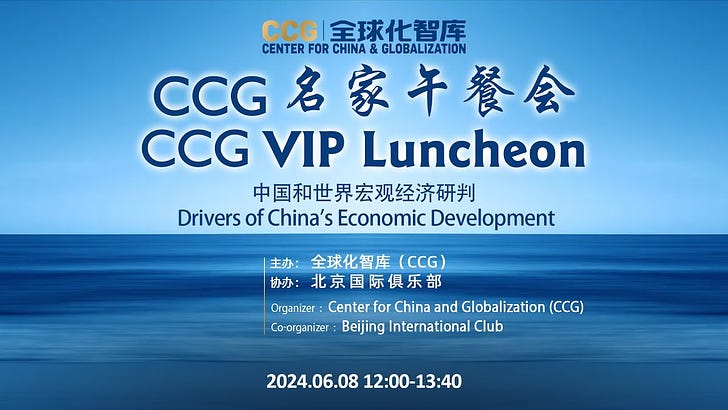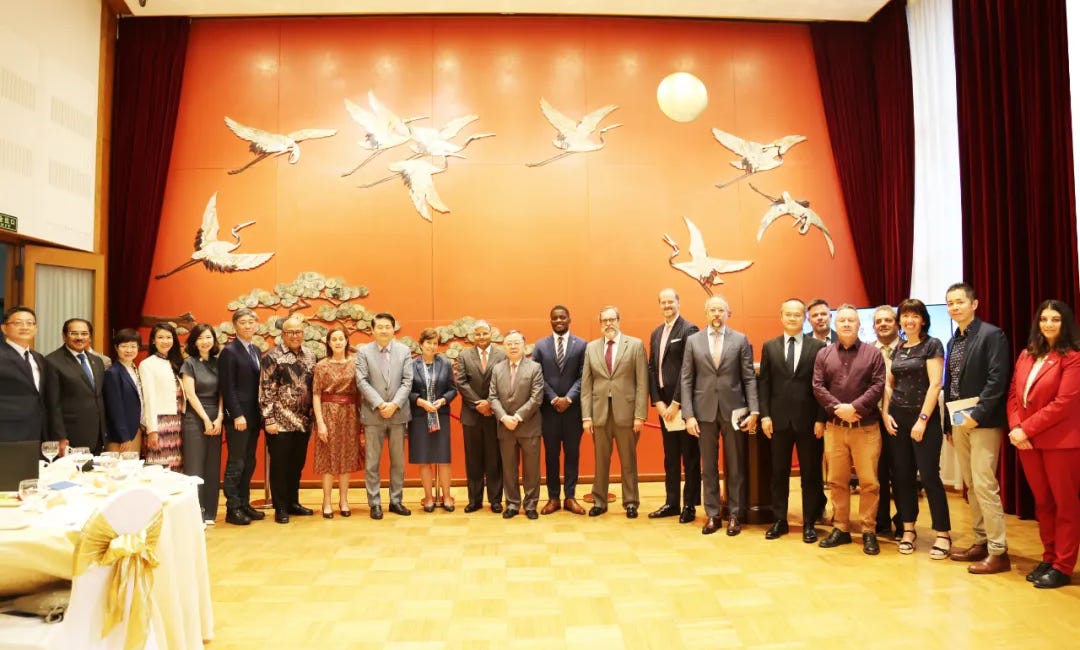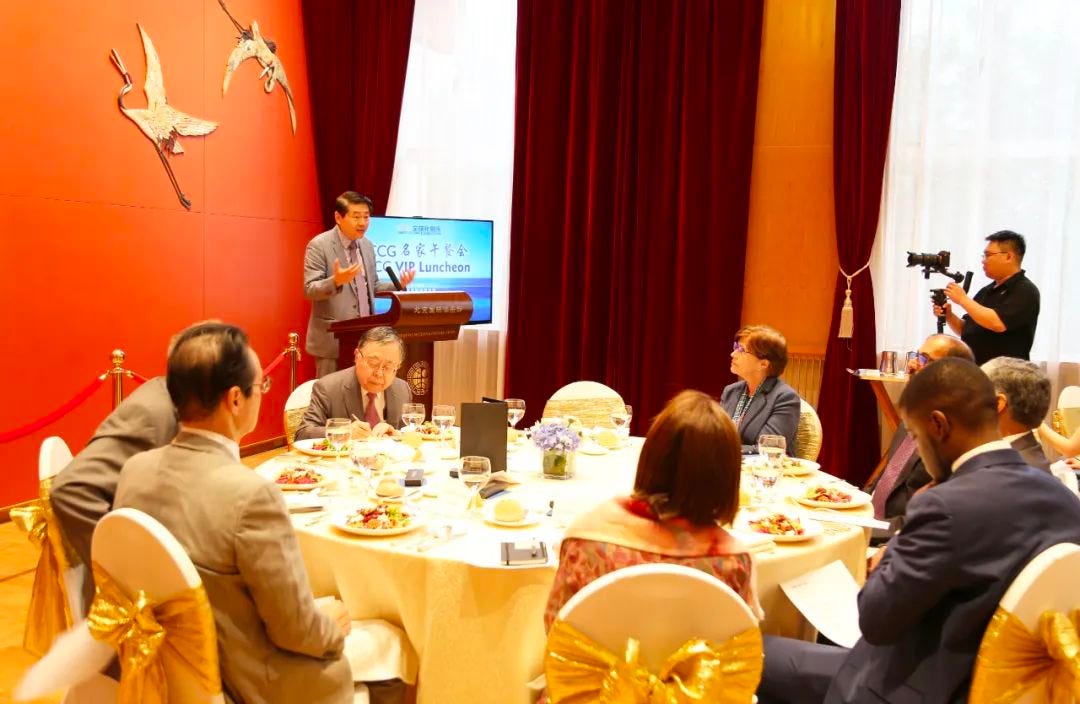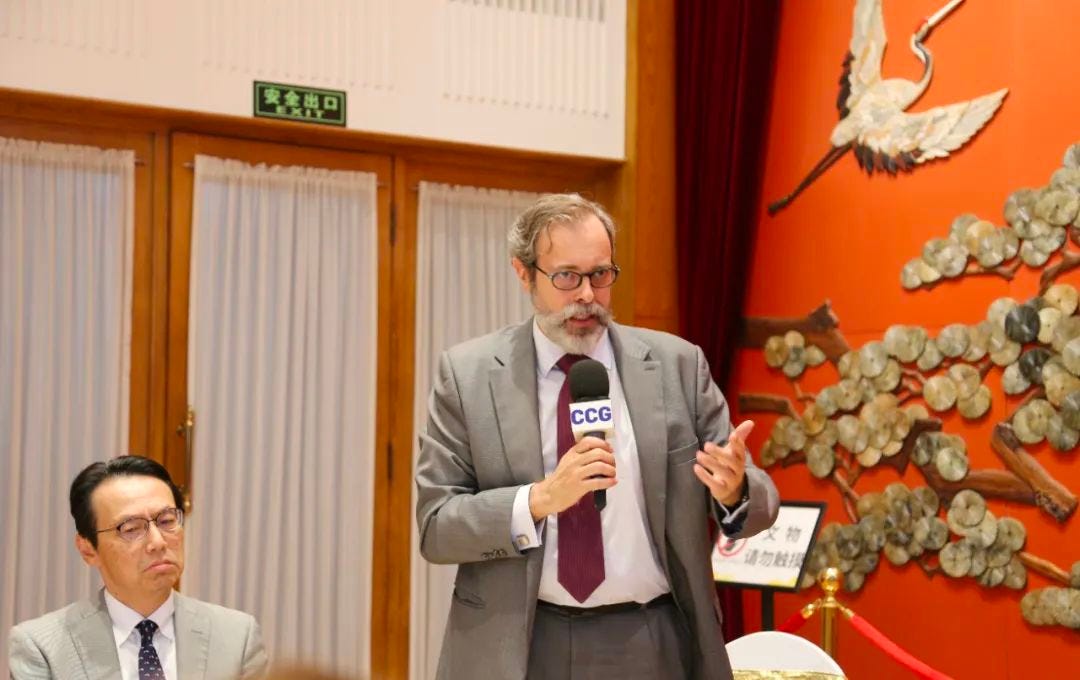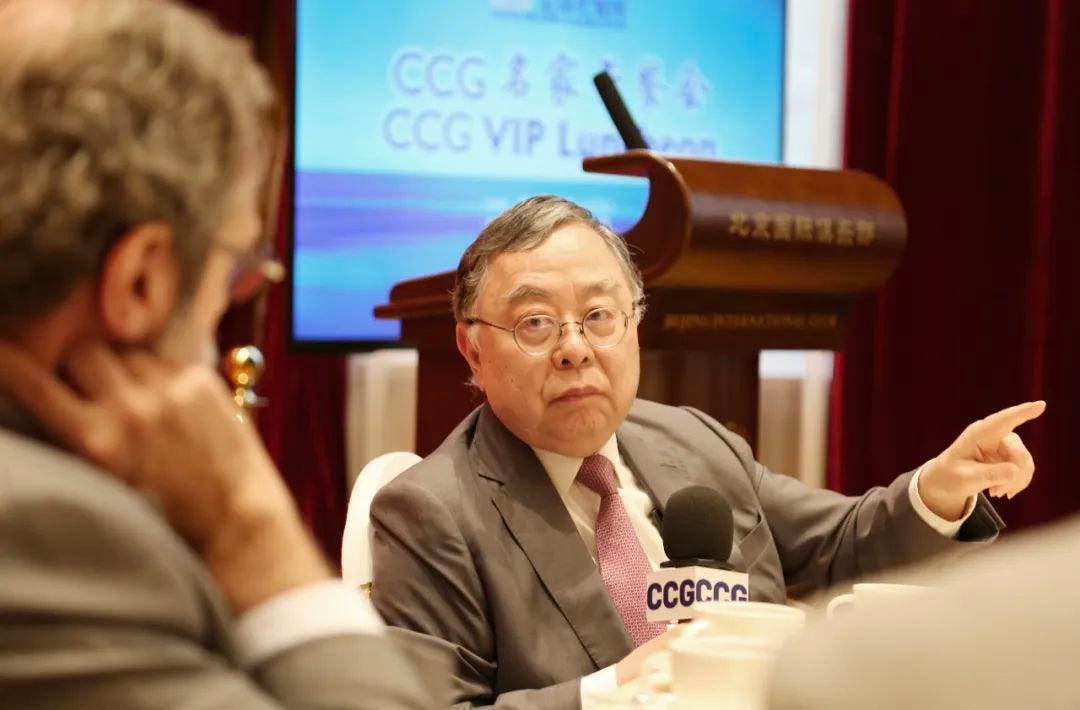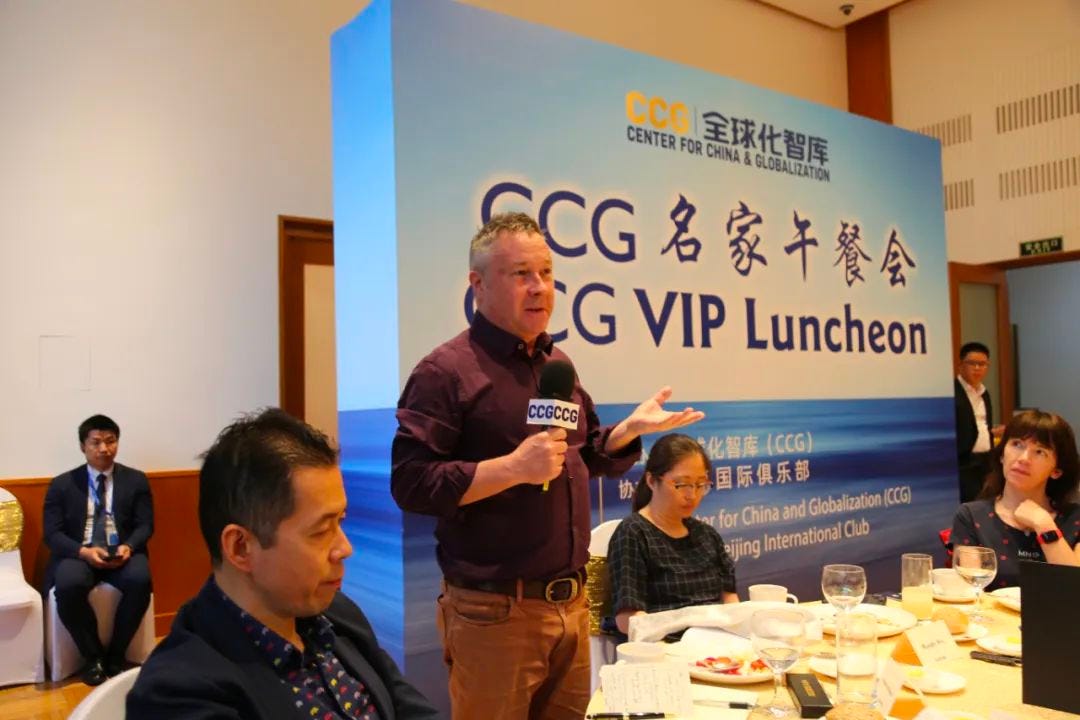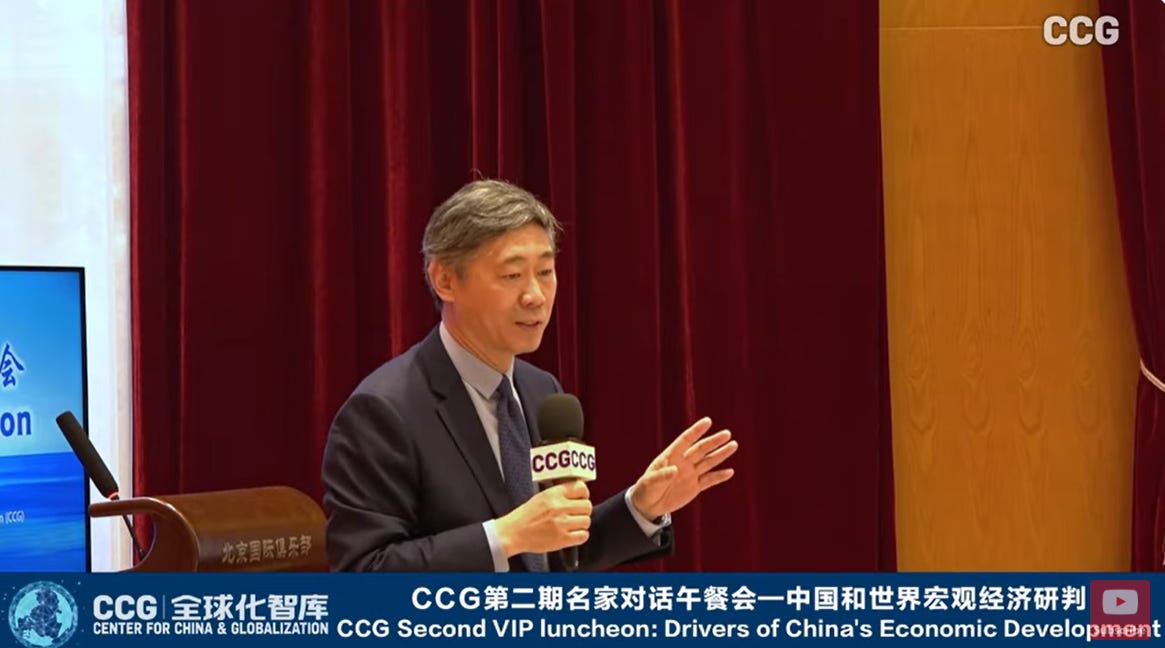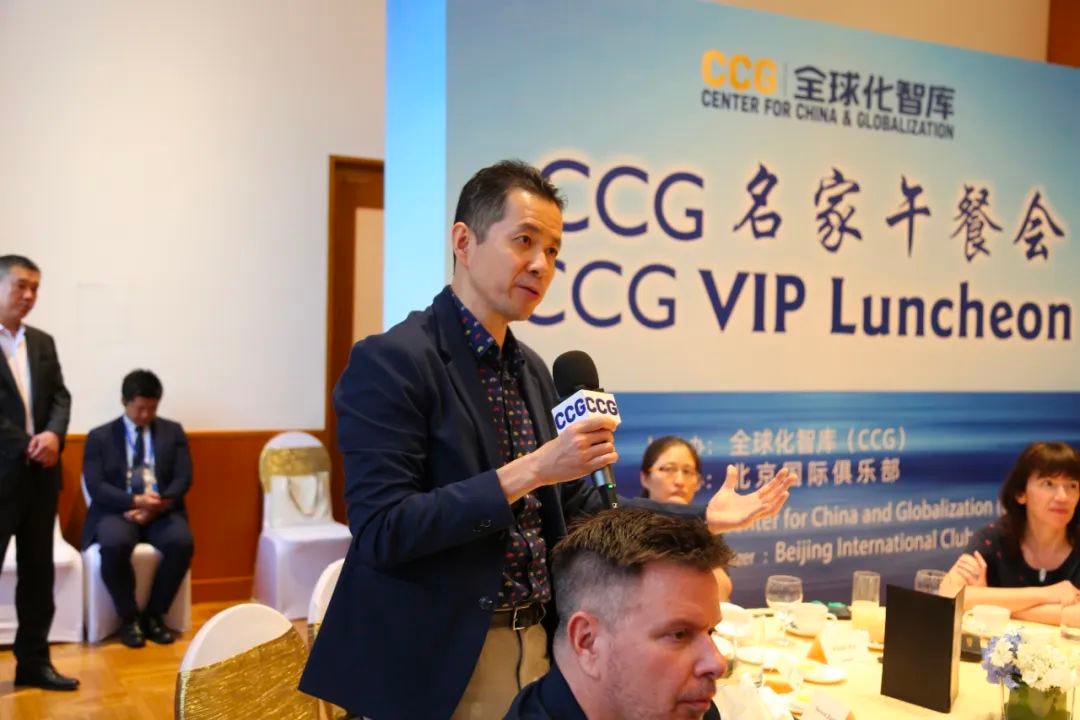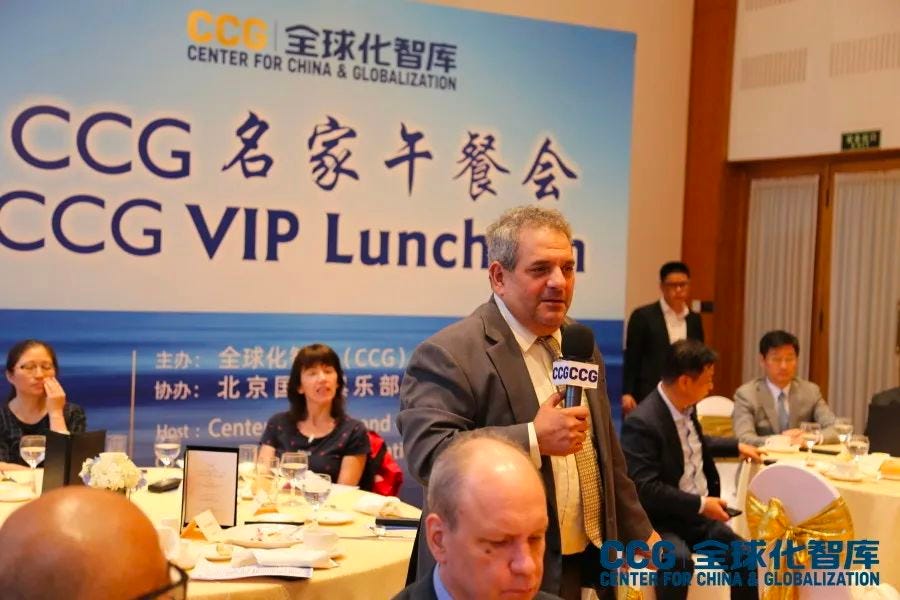CCG VIP Luncheon Q&A with Ronnie Chan & David Daokui Li
On China‘s economy, Third Plenum in July, Hong Kong, and the affairs of the world.
The Center for China and Globalization (CCG), supported by the Beijing International Club, held a second CCG VIP Luncheon last Friday, June 7.
The luncheon was held in the historic Xianhe Hall of the club and featured Ronnie Chan, Honorary Chair of Hang Lung Group, Chair Emeritus of Asia Society and the Chairman of its Hong Kong Center, and David Daokui Li, the Mansfield Freeman Chair Professor of the Department of Finance of the School of Economics and Management of Tsinghua University and also the director of the Academic Center for Chinese Economic Practice and Thinking ACCEPT.
We have already published the first part's transcript, which includes Chan and Li's speeches.
Today, we are publishing the second part of the event, mainly the Q&A with Chan and David, with questions from the Portuguese ambassador, BBC, CNN, and The Economist.
In the Q&A, Ronnie Chan criticized U.S. President Joe Biden’s recent comment on China’s economy in the latter’s interview with Time and defended the path of Hong Kong. David Daokui Li says China’s policymakers are finally coming to the conclusion that domestic consumption rather than domestic investment needs to be stimulated in order to spike China’s domestic demand for a long overdue economic rebalance, hinting at potential reforms at the coming Third Plenary Session of the Communist Party of China’s 20th Central Committee in July.
The following transcript is produced based on a video recording, accessible both in China (CCG has broadcast it domestically) and on YouTube.
The transcript has not been reviewed by the speakers and may contain errors.
WANG Huiyao, Founder and President, CCG; Former Counselor to China State Council
Thank you, David, for your very insightful and also very policy-driven discussion and thought sharing. I think it's really great. We need a lot of proposals. You talked about that the infrastructure of China is really more on for young people. Absolutely, we need to share that infrastructure with other generations to come. China already has about 70% of the global high-speed railway and 70% of the global 5G system. So we really need to delay the payment. Absolutely a good idea.
On the real estate, I think you have also proposed valuable ideas. Urbanization is certainly the big one. I would like to add that we have 300 million migrant workers, and they all have household lands in rural areas. If we can really privatize the household land and let them circulate, to transact, there will be really enormous demand for the real estate market and also for the urban residents to go down to the countryside to purchase the household land there. That would be, I think, the lowest-hanging fruit. So we hope that there will be more innovative policy. Since you have distributed books, we'd like to have the Q&A for both Ronnie and David. So any questions, comments, and observations? Welcome to raise. Also, you should have a microphone from somewhere.
Since we have the Ambassador of Portugal here today. You've been to Macao. Ronnie from Hong Kong, and you go to Hong Kong quite often. So perhaps you could share a few thoughts on what we can expect from the Greater Bay Area's development and [inaudible] Macau last year.
Paulo Jorge Nascimento, Ambassador of Portugal to China
Thank you very much. Yes, profiting the fact that we have someone coming from Hong Kong here. My point would be that we have been looking carefully looking into that. We are probably the only embassy bridging with the Greater Bay Area idea. I call it idea in spite of the fact that it has been around since the 2000s, the fact is that for the time being, we know what is foreseen --the integrational of the nine cities, seven on the mainland, plus the special administrative regions of Hong Kong and Macau.
But to be honest, even in spite of the fact, we also know because it has been announced that Hong Kong has a special role to play in terms of logistics and finance and that Guangzhou has a special role to play in terms of incubation and education, and Macau in culture, it's still hard for us to understand completely how these different, even legal realities, are going to work together. From the infrastructure's point of view, it is quite easy to understand that, although it's more probably easier to connect intersections in mainland than the other two special regions. Even though advances have been made in that respect -- the railway between Hong Kong and Guangzhou, a bridge between Macau and Hong Kong, and the Hengqin Cooperation areas between Zhuhai and Macau, but on the legal framework, which is going to be future-oriented and be the infrastructure under which everything is going to work, it's not clear for us. So there are still some doubts on this.
We are super convinced that this is a project that is going forward in a high speed. But at the same time i think, it would be useful for everyone to understand it better. I've been, as I said, in Macau a couple of times. Every time I go to Macau, I speak with people there in authority, civil society, and entrepreneurship about that. When we go to Hong Kong, there's the same thing. I was recently in Hong Kong with my Minister of economy and in Macau also with him. It's hard to understand. So it would be really great if we could have your views and also how you see this going on. Thank you.
Ronnie Chan
First of all, I'm a business guy. I'm going to make money and wherever there's money, as long as I can make a legal outdo.
When Shenzhen first rose, I didn't believe it because I saw the whole Shenzhen. I stood at one end of the street, I could see the other end, and that's it. Look at Shenzhen today. 22 million people. One of the top countries [sic] in China and a technological center. Pudong -- when it opened up, I didn't [inaudible]. As of today, I do not own a single inch of land in Pudong. I bought in Puxi. Today, the office rent in Pudong is higher than in Puxi. My building in Puxi has the highest rent in Puxi, but Pudong is higher than me.
So, you know, with the Greater Bay Area, you just put a name to it -- GBA. Whether you put a name to it or not, the reality is economic activities are gonna continue, just like if you don't have the central government pushing it, it may take 20, 30 years; with the government putting a label to it and pushing it, you may accomplish this in 10.
So the GBA is a very natural thing. One of the biggest problems in the old days is that Hong Kong people have a sense of superiority. That is really, really stupid. When mainland Chinese people come to Hong kong to buy and they hate them, and the same guy who hate the mainland Chinese guys buying in Hong Kong 10,15 years ago is today, every weekend, shopping in Shenzhen. It's cheaper. In the old days, the quality is not as good, but today it is equally as good. And I just joke I said, let's hope that nobody will hate them. I don't think anybody will hate them, but they certainly deserve to be hated.
Anyway, a lot of people in Hong Kong say, hey, it's terrible. Hong Kong people are leaving to shop in Shenzhen. I said, what's wrong with that? Such is economic reality. Face the music, grow up. When it's cheaper over there, equal quality, people will go there to shop. Now you can go there in 15 minutes on a high-speed train; the first stop is 15 minutes away. And so that kind of integration, I think in the long haul, is good for Hong Kong.
As far as the whole GBA is concerned, it will take some time for it to find its place, in particular mainly because the Hong Kong piece was a little bit different. As you mentioned, ambassador, that the laws, the language and so forth are still a little bit of an issue. The language issue is disappearing, but the law issue is still here. But how does it differ? I just came back from Mexico. I came back from Ensenada and Tijuana. And how does it differ when you have huge nexus of economic activities between Mexico and the United States, which have different language, different law, right? And they just adjust. It's not a big deal. When there's money to be made, people will adjust.
So I think sooner or later, Hong Kong and the rest of the GBA will of necessity get together. Moreover, 50 years ago in Hong Kong, where did we make our money? In the United States because those were the days when America was dominant in the world, economically speaking and in many other ways. So Hong Kong people had no choice but to look to America. And then Europe rose, so we looked to Europe. That's where the money was. And then Japan rose and then we went to Japan. Today, Hong Kong is still one of the largest export markets for Japan in many fields and many products. Where is the money today? America? Her money is not allowed to come to Hong Kong in terms of the stock market. So the biggest money for the last 30 years for Hong Kong as an economic city is the mainland China. The only problem is that Hong Kong people have a little bit of a heart problem. They have a little bit of psychological problem. Now I think Hong Kong is getting grown out of that and Hong Kong will increasingly integrate into the GBA area.
People then say, in my opinion foolishly, that Hong Kong will become another mainland city. I think these guys are blind. We have a different law. We have a different language. We have a different connectivity with the rest of the world. How can it be another [Chinese] city? And in fact, to be another city is not a bad thing because that's where the money is, my friend. So I think that Hong Kong's integration with the GBA is inevitable and it's mutually beneficial. They cannot go without Hong Kong and Hong Kong cannot go without them. For example, Hong Kong has top universities in the world. By the way, ladies and gentlemen, Hong Kong is the only city in the world that has four universities that rank among the top 55 in the world. Even Boston, London do not have four universities rank among the top 55 in the world. But Hong Kong never had enough land to help those professors and students of science and technology to be entrepreneurs, to build a business in Hong Kong. In the last 20 years, a lot of them had to move north into Shenzhen in order to succeed, such as, many of you know that drone company --大疆 DJI. That's a student of mine from the Hong Kong University of Science and Technology. You taught there as well. So I think that these kind of things by Hong Kong's integrating in mainland China psychologically as well as in many business ways, I think it can only be good for Hong Kong and for the rest of the GBA, which means that China will have another region that is going to be a fast growing region. Now obviously, the Pearl River Delta has been THE supply chain center and the biggest supply chain in the world. And as much as America wants to dis-engage [inaudible], I think that eventually the inflationary pressure is gonna be so huge that America itself would not be able to withstand.
Where else? You tell me one place in the world and I will tell you why it cannot build what the what the Pearl River Delta has has built. The only other place is the Yangtze River Delta. I go around the world, as I told you, I went around the world three times in one month. And when I go around the world, I just cannot find another place that has all the ingredients necessary to build another supply chain center. So I think that the GBA will continue to be important in that regard as well. Sorry for the long, winded answer to your question, Mr. ambassador.
Stephen Mcdonell, BBC
Hello, Steven from the BBC. I've got a question for Professor Li. You mentioned you wanted to scrap the restrictions on property purchases.
Now, one of reasons I've got in is that people couldn't afford to buy property. These debates go on all over the world, by the way. You mentioned the food delivery drivers earning their 7,000 kuai [yuan] a month. You take away those restrictions; property prices go up. How does that help them buy into the market? I don't know whether it would make it worse for them. I know, probably, everyone's looking for a way to reinvigorate the property market, but many Chinese people I spoke to said those restrictions should have come in much earlier and actually should have been much tougher. You take them away, and up go the prices again. Then you've got this huge, ridiculous split in society between those who can and can't afford to buy property.
As a comparison, I'm from Sydney. When my parents were young, everybody could land a good job. Everybody could buy a house. You've got any normal job, you can buy a house. Now, people in Australia can't, among big cities, and some of them never will. So, the debate has been going on along these lines and some are saying they want restrictions along the lines what the Chinese government actually brought in because property is different to other sectors of the economy. So under your proposal, how do those people get into the property market, the ones earning 7,000 kuai [yuan] a month?
David Daokui Li
Okay. A wonderful question. I know you are a journalist, but you're not doing business. Do you know that households are very different one from the other? People are very different. There are people who have high income, there are people who have low income, and there are different kinds of demands for housing. Right now in Beijing and in Shanghai, it is the relatively expensive apartments which are in high demand. So this is not that, "everyone is the same, we all have the same income, and the price is too high." That's my first point.
So let the market go. You're supposed to believe in free market. You're coming from the UK , BBC, right? I'm a believer more than you.
The second point is more important -- a very important point. The way to solve the issue of affordablility of housing is very simple -- the Chongqing model. Supply more land. Seriously. Provide more land for housing construction. Now, why, in Beijing, the housing price is so high? Take my neighborhood as a case study, I'm from Wudaokou, 40 or 50 minutes away from here. Wudaokou, Tsinghua University. Here we have an alumni, Wang Xing. We call ourselves the center of universe, because of housing prices, not because we do academics so well.
Why is the housing price so high near Tsinghua University in Wudaokou? Simply because business is booming. The local government of Haidian [District] wanted or has been wanting to collect tax by setting up office buildings -- Ronnie knows this very well -- so in comparison, withhold land for housing construction and allocate the land for office buildings. By having office buildings, they call it fancy names: Tsinghua University Science Park. Startups come. When some of them become like Wang Xing's Meituan, they collect tax. Even if you're losing money, they still collect tax from you. You pay your tax, right?...ByteDance, 1 km away from Tsinghua University, is the biggest taxpayer of Beijing.
Local governments became super rational. They allocate land to office buildings and to factories. If there's a tremendous business opportunity somewhere, they don't allocate land for housing. Chongqing got it right. Chongqing said, okay, we have plenty of land for housing development. If the housing price goes up, we provide more land. So in Chongqing, the most expensive piece of property, I think it is called Raffles Center, right? Last time I checked, still something like 30,000 to 40,000 RMB per square [meter]. This is the fanciest, five-star or six-star apartment buildings. So that's the solution. That's the right way to go. Overall, I am more free-marketed than maybe you think.
Stephen Mcdonell, BBC
But the market doesn't work elsewhere, does it? Not in terms of what I'm talking about.
David Daokui Li
Yeah, okay. In principle, the market works most of the time. And when it doesn't work, the government should come in to resolve the problem, right? The government should provide adjustments in the housing market. We have done this so many years. I think now it's clear to everyone. Provide more land for housing construction if the housing price goes up. That's the right way to go. We can debate about this for a long time. Let me stop here.
Steven Jiang, CNN
My question is actually for both Ronnie and David. Steven Jiang, CNN. I'm sure you've read recently the interview with Time, President Biden described China's economy being "on the brink". That, obviously, is something you shared based on what you just said, but I just wonder, given he has all the intelligence birefings and government secretaries' advice, do you think there is any validity to that assessment or is it just pure politics? Also, if and how problematic would it be for both the U.S. and Chinese economies if he's making decisions based on that assumption?
And related to this is: Do you think this is simply a gap between perception versus reality? Because if you talk to people both outside and inside China, there's a lot of people who are quite pessimistic despite what you guys have said. You know, David, you made a lot of proposals, people will say that's rearranging deck chairs on the Titanic, right? I've heard that analogy, too. So I'm just wondering, do you think there's a reason for that and how do you address that? Is there due to some reason the Chinese government's own doing, for example, that prioritizing security over everything else, including econmic growth? Thank you.
Ronnie Chan
Well, first of all, if you cannot tell the difference between political talk and economic reality, you should not be in business. So stay as a journalist.
Steven Jiang
That's harsh.
Ronnie Chan
You just listen to what the American government, many of the Western governments are saying about China. There's no resemblance to reality. 假的就是假的 [What's fake is fake]. It's really, really sad.
But on the other hand, that's what, I'm sorry, what politicians do. They have political agenda to accomplish and it doesn't matter whether it's factual or not, they just say it. And when you're powerful enough, and for example, they keep saying that the Ukraine war is unprovoked, unprovoked, unprovoked. Ladies and gentlemen, really? But you know the facts. They keep saying Russia is losing and Ukraine is winning. I go to Russia every year before COVID. I go to Ukraine periodically. I have a lot of friends there. I just came back from Poland; I helped these women and children whose husbands are fighting in Ukraine. HORRIFIC.
So, you know, all those things that you read, you guys have no choice. When Biden says something, you have to report it. I feel bad for you. Those guys lie. You don't lie. You just report what they say. But if they lie and then you report it, what does that mean? So, you know, it's not a big deal. I mean, they can say whatever they want to say. China is China. It doesn't mean that China doesn't have challenges. I told you a lot of the challenges that China is already having right now.
That's why I say there's no winner in U.S.-China contest, but there can be losers, and both sides can lose. And most of the times, when you lose, it's not because of international relationship, it's because of domestic affairs. Big countries always have big domestic issues, and both sides can lose it because of domestic affairs.
So, we'll see what happens. Nobody can say there's zero fact to whatever is said--10% fact, 90%, whatever. It depends on who says it. And you can get away with murder in international politics. What's new? Has been like that for the last 500 years. So be it. Accept it. And I go on happily making money.
I think China is still a good place. I'm still sending money right here. Money talks.
David Daokui Li
Ronnie put it very nicely. He's really truly a wonderful businessperson. He's super successful in the property market in Shanghai. I know your projects.
Anyway, very quick. The economy is running still 3.9% nominal terms in China Q1. In real price terms, it's 5.3%, whether it's accurate or not. But in nominal terms, this is first quarter GDP in current price compared to last year, 3.9%. And this economy is still turning up new innovative products. This economy is still generating new companies. This economy is still having lots of demand for your lunch boxes, Meituan. People are going tourism on the coming three-day weekend; lots of tourist spots will be congested. There's no sign [the Chinese economy is] collapsing.
It's not running as well as it should be. It's running below potential. I'm being very accurate. That's true. That's already recognized. By the way, the U.S. is running above its potential, causing inflation problems, which is not sustainable. Let's not get get into it. The two economies, the U.S. and China, are always mirror images of each other. Watch out any feature of the U.S. economy, turn it around, and it's the Chinese economy; vice versa. As an economist, I honestly disagree with his assessment. I'm being very honest, very frank. The economy is not running as well as it should be; it's running below its potential, but it's not collapsing.
Most importantly, the Party General Secretary Xi Jinping said last December one very important line. In Chinese, it's 发展是硬道理, economic development is still Job 1. This hasn't been said for many years. Now finally coming back, this gives me confidence as an economist. 发展是硬道理, Deng Xiaoping's line. I don't know how to translate it.
Henry Huiyao Wang
Economic development is the hard truth.
David Daokui Li
It's hard to understand for the Americans or the Britons, so I follow the Ford Motor Company's moto. It used to be "Quality is Job No.1," right? Remember in the 80s. So I say economic growth is Job No.1. For Motor companies, translating in to Chinese, growth is No.1. For US company, quality is Job No.1
Ted Plafker, The Economist
Thanks very much for the lovely event, for the second time. I'm not an economist, I write for a magazine called The Economist.
[Laughter]
Professor Li, your recommendation that there be a shift away from production and towards more consumption and you seem confident that at the Third Plenum may be this. I've been hearing it for a very, very long time. I remember in 1998, it must have been, Premier Zhu Rongji was at his press conference and he said something like 刺激内需 [stimulate internal demand] and I had to look up 内需 in my dictionary -- internal demand. Stephen Roach has been coming here for years and years, saying we have to rebalance, less fixed asset investment, more consumption, encouraging consumption.
Everyone's agreed it should be done and it just hasn't been done for all these years. There are obstacles. As you said, policy makers are rational. There are good reasons why things do or don't happen. So I wonder now if you have more confidence that it might happen now. And if so, why has it not happened all these years and what is different that will allow it to happen now?
David Daokui Li
Good question. So let me briefly answer this. I really would love to have Ronnie have his insights. Final words from you, okay? Always.
My brief answer is this: when you talk about internal demand over the years since Zhu Rongji 内需. Usually, policy makers refer to domestic investment because in China, 内需 is domestic investment plus domestic consumption, relative to exporting.
But to answer the question why policy makers have not been forthcoming with the policies that you allude to -- basic social welfare provision, public housing, so on and so forth, there's one fundamental belief which is now changing. That is, if the government provides too much social welfare, the population will become lazy. I'll put it in brutal language. I'm sorry, it's not diplomatic. We should avoid getting into the problem of the British disease. I'm sorry for people from Britain. In economics, we call it British disease and we have Dutch disease. Many countries have a disease. The Dutch disease means that when you suddenly discover a lot of crude oil, then you export crude oil, get a lot of foreign currency, then your currency appreciates so quickly that your domestic industry gets tricked into no competitiveness. The British disease is that the government provides too much social welfare, therefore people don't look look for jobs.
So China, somewhere, somehow or the past 40 years, when the incumbent policy makers were getting their college education like myself, we were educated by what we call Western economics, which talk about the British disease. This is the Mrs. Thatcher and the Reagon era. So our mentality is framed by that. We're supposed to say, okay, the government should work hard on the supply side; don't worry about demand side; too much social welfare will kill the enthusiasm of the population for working hard.
So I think we were wrong. At least we were pushing too hard in this direction. The Chinese people, in my view, are genetically -- I hope you agree, Mr. Wang Xing -- genetically programmed to work too hard. We should relax. I'm criticizing myself. I'm not criticizing anybody else. I can make jokes on our people, right? I'm not politically incorrect. So we're not relaxed enough. So much so that the little bit extra welfare programs for us, for our population, will not make us lazy. We won't become lazy.
I think my friends in the policy making community are coming to this realization. They're coming to this. So I really felt excited when I watched Chinese 7 p.m. Evening News on CCTV where President Xi said, okay, let's do reforms to make sure the population can really feel it. I'm excited. I'm confident he refers to this. Next stage, we need reforms to provide more welfare.
Let just give one example to make things concrete. When young ladies deliver a baby, you know what is the most difficult thing for Chinese families? Take care of her in the first month. We have a tradition that the first month after a baby's birth, the most important thing is her life. So tremendous energy is spent in the first month we call 坐月子, the first month's care. Now many families are worried about this okay anticipating the huge cost of the first-month-of-the-baby caring. They wouldn't want the second baby or not even the first baby. So I've been proposing that why not give 10,000 RMB to any family having a new baby to take the first one month (care)? Not a big deal...If you calculate it, it's a small amount of money in public finance. So I think my proposal is gaining popularity. We'll do that. We can do that. There are lots of interesting things we can do.
Also, from age 3 to age 6, preschool education should be free for everybody. Our population is not growing as fast as before. So there are many, many reforms which are not expensive from the public finance perspective, which will be popular, and which will relieve people of the burden of daily life so they can consume more. I think this is a win-win. Things are slow but I'm confident. They are coming. They are coming along.
Audience [Unidentifiable]
So you're saying a little bit of British disease will be okay?
David Daokui Li
Exactly. In Chinese, we have a saying, "All medicines are poison," but the right thing if you take the right combination of poison to cure your disease. We all have disease. I may be politically incorrect. We all have problems. But we need, here and there, formula from other economies' problems, mix them, take them. Poisons coming together in compound can solve our health problem.
Let's have final words (from Ronnie). Are you worried about the Chinese people getting British disease? Are you worried about people not working too hard?
Ronnie Chan
I worry about many things in China and I've been doing that for the last 40 years. But frankly, I look around the world and I said, nobody's in a good shape. Everybody has their own challenges. The U.S. has tremendous challenges, as I mentioned. Europe, as far as I'm concerned, will be the place in the next 5, 10, 15 years that may undergo tremendous changes because of necessity. Europe is quickly becoming very, very uncompetitive. It's not just because of the oil price rising so much of late, but in many other areas.
So I think that there will be so many changes that is happening simultaneously in different parts of the world for different reasons and to different outcomes. How they interact with each other when they are facing their own domestic problems, that to me is a second and tertiary derivative [inaudible] of just a simple problem of yourself. There's a Chinese saying that I used, so let me first say it in Chinese. I've said it for the last year or two. 现在是保命保本的时间,不是大发展的时间--now is the time to stay alive, preserve your capital; now is not the time to become aggressive to expand in many ways, for business people as well as for non-business people.
I'm an internationalist. I'd like to see the U.S. and China live peacefully together. But if one side does not want it, there's nothing you can do, especially when that one side is the stronger and the more powerful side.
Let me conclude by amending something I said that I forgot. That is, the fact that America may be moving toward isolationism does not in any way imply that America is waning. Absolutely not. Their universities are still by far the best in the world, especially in basic sciences. Their ability to convert from science to technology and from technology to commercial products is by far the strongest in the world. Their capital market is still amazing. Their economy is the most resilient. Their entrepreneurship is still very strong.
So when I say that America is likely retreating to isolationism, let's make sure that none of us take it to mean that America is waning. They are not. They have the right to retreat to isolationism. Not many countries can do that. Among all the major countries in the world, I only know of two. Sorry, Canada is a lovely country, but only 30 million people -- lovely country but not that big population-wise. There's only two countries that can do that, and that's Russia and the United States. China cannot do it because we don't have energy security, even food security can be challenging.
So America's retreating to isolationism does not imply in my mind the waning of America. They just choose to take a breather. No one knows when they will come back out into the international sea but they are not waning. So a lot of people in this country are now talking about 东升西降, the East is rising, the West is waning. I said, be careful what you say.
I do not deny that Europe is having tremendous challenges. Henry Kissinger said to me, Europe is over. I said, no, come on, it's not over. He said, it is over. Helmut Schmidt, the former German Chancellor himself a dear friend of mine for 35 years before he passed on, said to me that the First World War destroyed half of Europe, and whatever remained, the Second World War did. So this is the view of two of my teachers. Whether you believe it or not, I suggest you be open-minded.
So Europe, I think, is undergoing tremendous changes. It's seeking independence in four areas:
Diplomatic independence
Military independence
Currency, to some extent, independence
Economics
So Europe has to undergo tremendous changes in order for it to continue to a serious player in the world.
You look around the world, India. You know that I love India; some of my best friends are Indians. I have my worries there, too. I don't know what you think about the latest election but anyway, I can tell you a lot about that one privately.
So looking around the world, there're just very few places that are very encouraging. In some ways it's "who is the last man standing." Now is not the time to try to knock out each other. Now is the time to survive. If you survive, you win because many will not.
Sorry to leave you with such a pessimistic thought. I have always been a rather optimistic person my whole life, but in the last 5, 10 years, I have increasingly come to a conclusion that..let me end by saying this: 12 years ago I was in a hotel in Wuhan with my son looking at real estate, which is now the Hang Lung Heartland 66, a 7 million square ft beautiful property there. Anyway, I said to my son that night, son I do not admire your generation . My generation is the luckiest, as I mentioned, but also the most irresponsible. We inherited an earth that is clean; we left it dirty. We inhabited a world that is basically debt-free -- soon after World War II after the initial war debts, debts were paid off, it was basically debt-free -- and then we now leave a world that is so debt-rdiden that I can't pay for it. Son, you will have to pay for it. And and on, I can say so much about that.
So just a private personal note to end my thoughts sharing. I don't have a grandchild. My son is happily married. We love our daughter-in-law. I think you have met her. You guys have met her. She is a lovely girl, right? My son absolutely married up. She's an architect from Berkeley and then a master's from Harvard University, and this and that. My son was at the bottom of the pile in high school and in college. So my son married up. But they don't have children. And my wife and I tell our son and daughter-in-law, we are very happy not to have grandchildren. If you have it, we're happy; but if you haven't, we're equally happy if not more because I see a world that you have to face, let alone your children have to face, that is -- pardon my language -- so damn bad that I'm not sure if I, as a responsible older man, want to bring into this world a young grandson or granddaughter that has a terrible prospect to the future.
I'm sorry, some of you may be very positive, very optimistic. As diplomats, you have to sing praises for your country. But sorry, that's not me. I'm a businessman.

